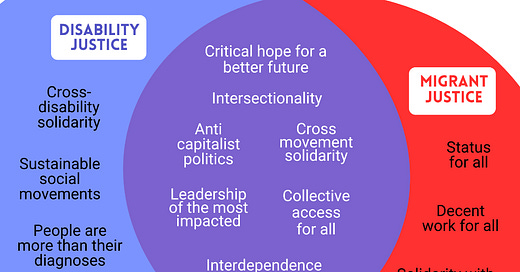Just Care Dreams digital toolkit set to reform home care
The Towards Just Care research project and DJNO call for a sector-wide transformation toward more socially just home care guided by home care receivers, workers and grassroots advocates.
Credit: Disability Justice Network of Ontario
Canadians have a well-established preference for home care that allows them to live in community and age in place. Despite that preference, long-term residential care (LTRC) is still the go-to for the Canadian healthcare system when dealing with issues of disability and aging.
In fact, 87 per cent of Canada’s spending on long-term care supports goes to residential care and as the population ages admission rates are likely to balloon.
During the COVID 19 pandemic, more people died in LTRC facilities in Ontario than in other workplaces, communities, and shared residential settings.
These are just a few of the many well researched facts and findings summarized in Just Care Dreams: A Toolkit for Building More Just Care Systems. The project was the result of a collaborative effort between the Social Sciences and Humanities Research Council (SSHRC) and the Disability Justice Network of Ontario (DJNO).
Researchers also found that over the last four years, care workers have left LTRC in large numbers due to burnout, trauma, and poor working conditions.
Direct care workers, overwhelmingly immigrants, had more care responsibilities during the pandemic including making up for staffing shortages. At the same time, the female dominated workforce had to deal with higher-than-average COVID 19 infection rates as well as more demanding work, longer hours and horrendous working conditions.
Home care is delivered by a very limited number of independent private sector providers with ParaMed being Ontario’s, and Canada’s, largest home care provider. Owned by Extendicare, ParaMed makes up almost half of Extendicare’s operations.
Readers may recall during the pandemic the army was deployed to Orchard Villa in Pickering, Ontario. The 233-bed LTRC facility is owned by Southbridge who subcontracted operations to Extendicare.
Military personnel exposed horrific conditions including residents lying on mattresses on the floor, a lack of hygiene, unsafe infection control and medication practices, and inadequately trained staff.
They also found cockroaches and flies, rotten food, residents in soiled diapers, residents without access to hydration and improper feeding among other highly problematic issues like oxygen generators without oxygen.
The military reported systemic issues that could be directly tied back to inadequate staffing and chronic under funding.
That finding did not surprise family members who testified before the COVID-19 Long-Term Care Commission detailing dangerously low levels of staffing on a regular basis that led to chronic neglect of residents long before the onset of the COVID-19 pandemic.
Claims made by the military and family members were backed up by a documented history of chronic non-compliance. In fact, Orchard Villa continues to be cited for poor care in a litany of inspection reports that describe many of the same issues exposed by the military.
Eventually, the local hospital took over management of Orchard Villa. The remaining residents were taken to hospital where it was determined they were severely dehydrated, anorexic, and some in kidney failure. A hospital spokesperson reported that Orchard Villa had only 20 per cent of the necessary staff on duty.
The fallout from this horrific tragedy should have fallen squarely on the shoulders of Extendicare and Southbridge executives who created and implemented policies that failed to provide the necessities of life.
Instead, in November 2020 the Ford government passed Bill 128, Supporting Ontario’s Recovery Act protecting those responsible against lawsuits arising out of exposure to and contraction of COVID-19.
In 2023, the Ford government issued Orchard Villa a new 30-year licence and 87-bed expansion.
In 2023, ParaMed provided 9.9 million hours of home care with fully 94 per cent of those hours being delivered in Ontario. ParaMed generated $469 million in revenue while Extendicare made $1.3 billion in revenue in 2023.
DJNO found that ParaMed provided inconsistent care and had high personal support worker (PSW) turnover. Extendicare blames staffing shortages for its failings. However, ParaMed has recently been accused by care workers and care recipients of double booking workers.
While ParaMed is paid for missed appointments, care recipients are left with minimal to no care forcing many into LTRC because they can’t get the consistent assistance they need, and are scheduled to receive, to continue living independently and to age in place.
That’s why the Towards Just Care research project and DJNO are calling for a sector-wide transformation towards socially just home care guided by home care receivers, workers, and grassroots advocates.
“Before this photo, I had not taken a bath since I was a child. Baths are difficult to get in and out of and are not PSW friendly. Our hotel room was very accessible and when I saw this standalone bath, I wondered if the Hoyer lift (in the back) could straddle it while I was lowered. My caregiver was more than happy to make my dream come true and be creative to strategize. This is what care means to me. No rushing, no drama. A moment of peace in the Mexican jumble,” Alessia Di Virgilio (2019). Credit: Alessia Di Virgilio
Their digital toolkit—Just Care Dreams—includes resources ranging from system navigation tools, advocacy tips, and maps outlining Ontario’s home care oligopolies and their networks.
Just Care Dreams draws on resource mapping, insights, workshops, and stories from a network of diverse home care stakeholders including low-income home care receivers, home care workers, and grassroots organizations representing seniors, disabled people, and migrant workers.
“When we talked to the communities around us, we knew it was time to come together, bring forward our common goals, and dream for better home care systems across these territories. We found examples and started to develop models of socially just care through this project,” explained Megan Linton, PhD Candidate, Policy Lead at Disability Justice Network of Ontario, and Community Lead on the Towards Just Care project.
“While this is only the first step, we want to share those insights and resources, so we can build more together,” added Linton.
The digital toolkit is only the first step in reforming home care and is meant to move people from learning how to navigate and understand the complexities of Ontario’s current home care system to envisioning and building just care systems that are publicly owned and directed, intergenerational, sustainable and holistic.
“We’re hoping these resources will help people in Ontario not just make informed choices about how to access and participate in Ontario’s home care systems, but also advocate for more socially just systems in the future,” said Dr. Mary Jean Hande, Project Lead and professor at Trent University.
Just Care Dreams believes community-driven coalition-building is the way to end mass institutionalization of disabled folks while demanding a better home care system.
The home care system needs to shift from a profit-driven to a needs-driven paradigm centered on the knowledge of both the people who access the system and the workers who provide home care supports rather than CEOs who answer to shareholders.
I encourage you to check out Just Care Dreams. Then, strategize how you and the organizations you belong to can help make a just and inclusive home care system that benefits disabled folks, elders, workers and communities across Ontario and Canada a reality.
Thanks to everyone who read today’s article. With your continued support, a little Nicoll can make a lot of change.





Great expose of of for-profit care. High time to remove these leaches, shut off the public dollars and drive the corporate scum out of Canada
Profit has no place anywhere in our healthcare system. I have had experience with homecare while caring for an elder in my home . I find no fault with the PSWs as people but they were being exploited.
The focus of change needs to be care not profit or politics. Conservative governments say that they are cutting costs to taxpayers but that is a lie, it costs more to provide for profits and political interests.